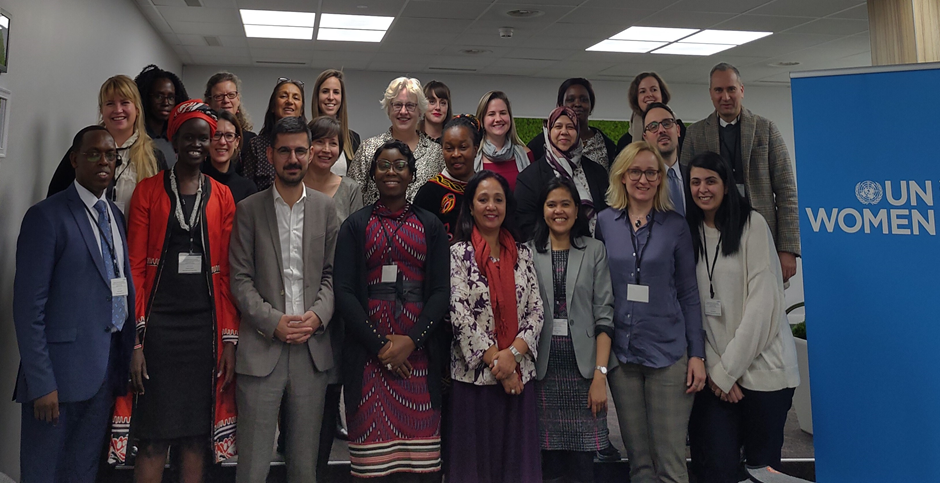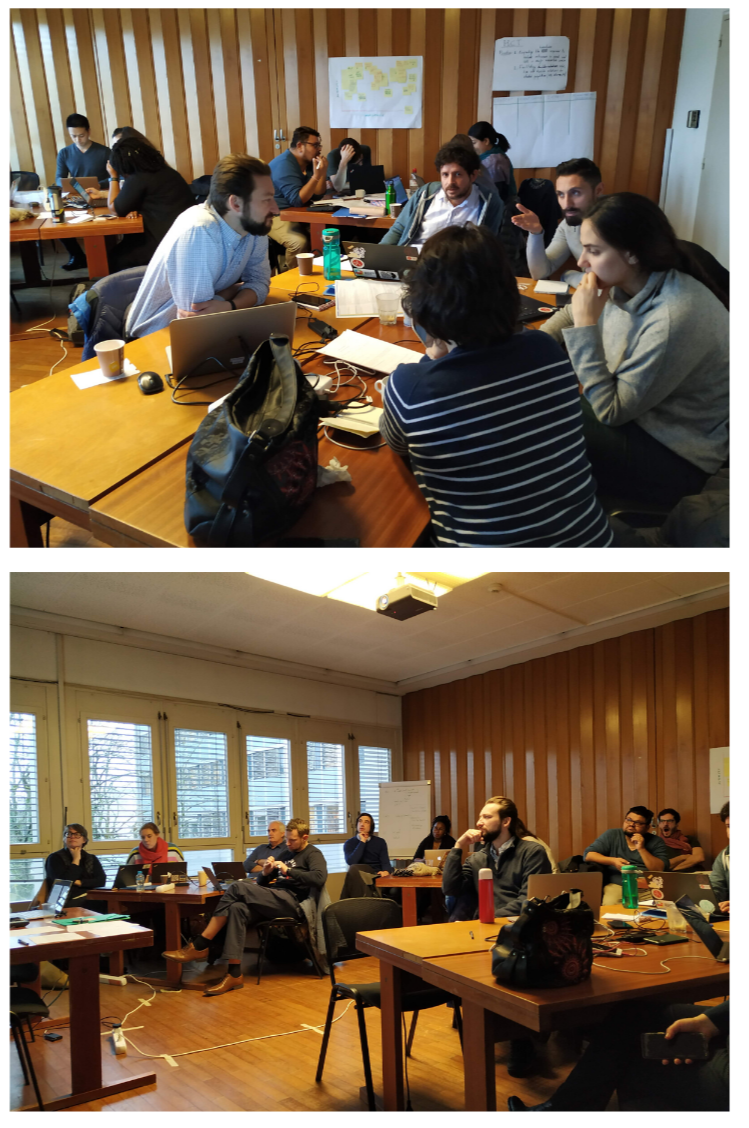The Grand Bargain Bimonthly updates - March 2020
For a better experience, open the newsletter here.
Dear Grand Bargain Signatories,
We hope you are keeping safe and healthy. We are pleased to share with you our bimonthly newsletter, good news during these extraordinary times - updates from workstreams and Signatories that have been advancing on implementing their Grand Bargain commitments, which you can read below.
You might have already seen the Global Humanitarian Response Plan for COVID-19, which contains some explicit references to the importance of and linkages to the Grand Bargain, especially flexible donor funding to enable rapid adjustments of the response, funding for local actors, and a harmonised approach to reporting and minimised bureaucratic processes to enable humanitarian partners’ timely and appropriate response.
Grand Bargain can and shall contribute to address the global crisis caused by COVID-19, which will impact greatly the most vulnerable and therefore our collective action is needed more than ever. We need to take action now in the spirit of the quid pro quo, and to support the process, the Secretariat is now looking into how the crisis links to the Grand Bargain commitments. We are collecting examples and good practices that can hopefully be scaled up within the humanitarian community, and we will share a visual overview soon.
Kindly note that while the Annual Meeting is still planned for 25 June 2020 in Geneva, we are closely following the developments and the advice from the authorities to see whether we will be able to carry it out as planned, or whether we will need to put in place alternative options. We are also looking at ensuring the appropriate sequencing, including to proceed with the meeting of Co-convenors on 12 May 2020. We will keep you informed.
Sending you our best wishes,
The Grand Bargain Secretariat
Latest from the workstreams
For further information or to reach out to the workstream Co-convenors, please contact the Grand Bargain Secretariat at gbsecretariat@un.org.
Workstream 4 (Harmonize and simplify reporting requirements)
Independent review of individual donor assessments on humanitarian operations
The workstream Co-convenors are conducting an Independent Review of Individual Donor Assessments on Humanitarian Operations. Financed by the Government of Japan and carried out by GPPi, the review will map the scope and variety of individual donor assessments covering ICRC, UNICEF, UNHCR, OCHA and WFP. The review will also look into the effects of these assessments on partners using selected country case studies. >> Click here to read more about the review.
Workstream 5 (Improving joint and impartial needs assessments)
Capacity building for joint needs analysis and further development of Joint Intersectoral Analysis Framework
Workstream 5 identified ensuring the availability of predictable, timely and appropriate human and financial resources for coordinated needs assessment and analysis as being of critical importance to advancing the quality of coordinated needs assessments and joint needs analysis. To this end, ACAPS, in collaboration with partners and OCHA have developed complementary needs analysis training programmes.
Furthermore, in January 2020 the Joint Intersectoral Analysis Group (JIAG) strengthened consensus on technical and theoretical aspects of the Joint Intersectoral Analysis Framework currently under development, and charted the path to its completion. >> Click here to read the full update.
Workstream 6 (Participation revolution)
Ongoing dialogue and workplan implementation
Workstream 6 (Participation Revolution) organised two briefings in recent weeks to provide updates on the workstream activities, including on the progress on implementing the agreed 2019-2020 workplan. One briefing aimed at aligning donor approaches to accountability to affected people. The second call was focused on the providing updates to workstream members on the workplan, where participants highlighted progress in advancing methods of collecting beneficiary feedback at the field level. >> Click here to read a detailed update.
Workstream 9 (Harmonise and simplify reporting requirements)
New website for harmonised reporting
Workstream 9 (Harmonise and simplify reporting requirements) published a new website, where you can find all the information and resources in relation to the 8+3 reporting template.
The more donors adopt the 8+3 template as a standard, the greater the benefit of harmonisation, reducing the reporting burden across the humanitarian system.
Friends of Gender
 Global Consultation outcome report: Promoting gender equality and transformative action through the Grand Bargain
Global Consultation outcome report: Promoting gender equality and transformative action through the Grand Bargain
On 13 December 2019, UN Women and the Grand Bargain Friends of Gender Group (FoGG) organised a global consultation in Geneva to enable a dialogue among the Grand Bargain (GB) Facilitation Group, workstream Co-conveners, Signatories, and representatives of local women-led and women’s rights organisations (WLOs and WROs) on results to date and priorities for 2020. >> Click here to read the full outcome report.
Latest from the Facilitation Group
Coming up
The main priorities for the next few months will revolve around the conceptualisation and organisation of the Facilitation Group (FG) meeting with the Co-convenors in May 2020 and the meeting with the Eminent Person in May 2020 and the Annual Meeting on 25 June 2020. The Facilitation Group is currently going forward with the plans for these meetings, but depending on the developments of COVID-19 outbreak, necessary measures will be taken in due course, and the Signatories and Co-convenors will be informed.
In addition, the FG will continue focusing on collecting and showcasing examples of the Grand Bargain implementation in practice at country and regional level. The Grand Bargain Secretariat has been tasked with developing stories of good practice together with individual Signatories, which you can find on the Grand Bargain website. If you have good examples of implementation to highlight, don’t hesitate to contact the Secretariat.
At the end of March 2020, ECHO will take over from WFP as FG Chair for April and May 2020.
Recap of recent activities
At its February teleconference, the FG was joined by workstream 2 (More support and funding tools for national and local responders) Co-convenors, who briefed the members on the outcomes of the Global Meeting on localisation and next steps. The FG welcomes this initiative and would like to encourage other workstreams to do the same should there be any specific topics they would like to discuss.
To strengthen accountability, the FG conducted a light exercise in January 2020 to analyse the progress on implementing collective and individual action points put forward by workstreams and Signatories at the Annual Meeting 2019. The exercise demonstrated significant engagement by you and the Signatories to move forward on the Grand Bargain commitments. Out of 15 collective action points, 13 were reported as completed or ongoing, and out of 48 individual action points, 35 were reported as completed or ongoing. This represents 76% of the action points put forward at the Annual Meeting 2020 and shows the engagement and commitment of the Signatories and workstreams. It is our hope that the self-reports and the Annual Independent Report will demonstrate this further. We have also continued our strong collaboration with the Eminent Person’s office. The team has been actively engaged in our exercise on strengthening accountability, as well as in the conversation on how to advance the localisation agenda.
Should you have any questions or suggestions in relation to the work of FG, don’t hesitate to contact the Secretariat.
Latest from the Signatories
ActionAid: Partnerships for humanitarian action: challenges for large INGOs without a traditional partnership approach
Global Education Cluster:Summary Report on Strategic Advisory Group Localisation Workshop
The Republic of Korea joins the Grand Bargain
Following a successful application and the submission of the 2020 self-report, the Republic of Korea is the newest, 62nd Signatory to the Grand Bargain. >> Click here to read more about Republic of Korea's efforts to improve the humanitarian system.
The Grand Bargain now includes 62 Signatories (25 Member States, 11 UN Agencies, 5 inter-governmental organisations and Red Cross/Red Crescent Movements and 21 NGOs) and represents 73% of all humanitarian contributions donated in 2018 and 70% of aid received by agencies. The Grand Bargain shows continued traction within the humanitarian system. In 2018 alone four new Signatories joined (one UN agency and three NGOs), one both in 2019 (one NGO) and 2020 (one Member State).

"In line with the Grand Bargain, the European Union remains committed to improving the effectiveness and efficiency of humanitarian action. In this sense, the European Commission Directorate-General for European Civil Protection and Humanitarian Aid Operations (DG ECHO) is launching pilot Programmatic Partnerships with several international non-governmental organisations. In the spirit of the Grand Bargain, we aim to provide more aid directly to beneficiaries by offering more predictable and flexible funding and reduced administrative burden in exchange for enhanced efficiency and transparency.”
Author: Ms. Paraskevi Michou, Director-General of Directorate-General for European Civil Protection and Humanitarian Aid Operations (DG ECHO), European Commission
Do you have examples of how your organisation rolled-out the Grand Bargain commitments at regional and country level? Share them with us here!

